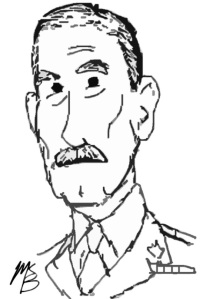Lieutenant-Colonel Herb Quinn
Regina Rifle Regiment

The Reserve Army is not being equipped for fun, but as insurance against the same thing happening here as has happened in other countries which believed themselves safe from attack. We must be prepared to combat internal subversive elements as well as to repel invaders from our shores, if such an emergency should ever arise.
(Quoted in Saskatoon Star-Phoenix, 14 Nov 1942 3)
Born on 8 December 1884 in London, Ontario, Herbert Joseph Quinn was a reporter for the London Free Press before moving west and settling in Manitoba in 1905. He enlisted with the 181st Battalion in May 1916 and joined the Canadian Machine Gun Corps in France in November 1917. He was wounded in August 1918 and earned the Military Medal. After the First World War, he moved to Saskatchewan, worked for the Moose Jaw Times-Herald and the Regina Leader-Post, and then established an insurance and real estate firm in 1928.
A long-time member of the Regina Rifles, Quinn served as second-in-command under Lieutenant-Colonel J.G. Robertson, who he succeeded in May 1940 for mobilization. “The ‘fifth column elements are apparently working in Regina as elsewhere,” he declared in the recruiting drive. “When you hear men aren’t wanted or cannot be properly equipped put it down to German sympathizers.” Deemed medically unfit for active service, Quinn relinquished command three months later to former commanding officer Lieutenant-Colonel T.G. Hewitt. He exchanged places with Hewitt to take temporary command of the 2nd Battalion (Reserve) before taking charge of an army training centre and then the 40th Reserve Brigade Group.
Quinn argued that the Reserve Army was better understood as the home defence force, reassuring recruits they were not training as reinforcements for overseas but instead to counter direct threats to Canada. He called on civilians unable (or unwilling) to volunteer for overseas service to at least join the reserves, stating:
With all due credit to those people who have bought war bonds, I still believe that investing money with the Government is no real sacrifice though it is a vital part of the war effort. The men at home, who are of an age and medical category which permits them to enlist in the Reserve Army, should be prepared to work some overtime to fit themselves as an organized force instead of a mob in the event of a national emergency.
Quinn retired from the army in 1946 and announced on the demobilization of the regiment:
As the first commanding officer of the 1st Battalion, The Regina Rifle Regiment, I take particular pride in joining with other citizens of Regina and of the province in extending a hearty welcome home … From the beginning of mobilization the esprit de corps of the regiment was excellent and the spirit of co-operation which existed between all ranks gave early promise of the wonderful record later achieved in action.
He died in Regina on 7 January 1959. His son, Lieutenant-Commander John Louis Quinn of the Royal Canadian Navy died when HMS Iroquois was shelled on 2 October 1952 during the Korean War.